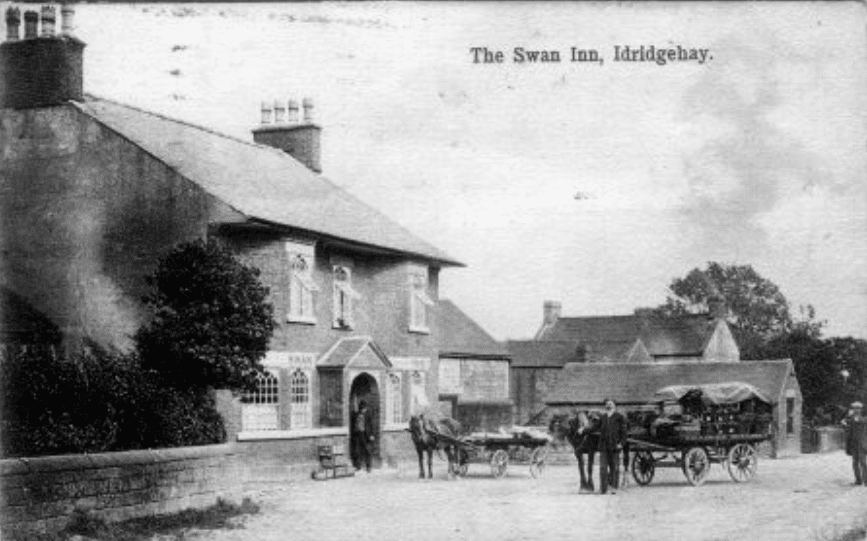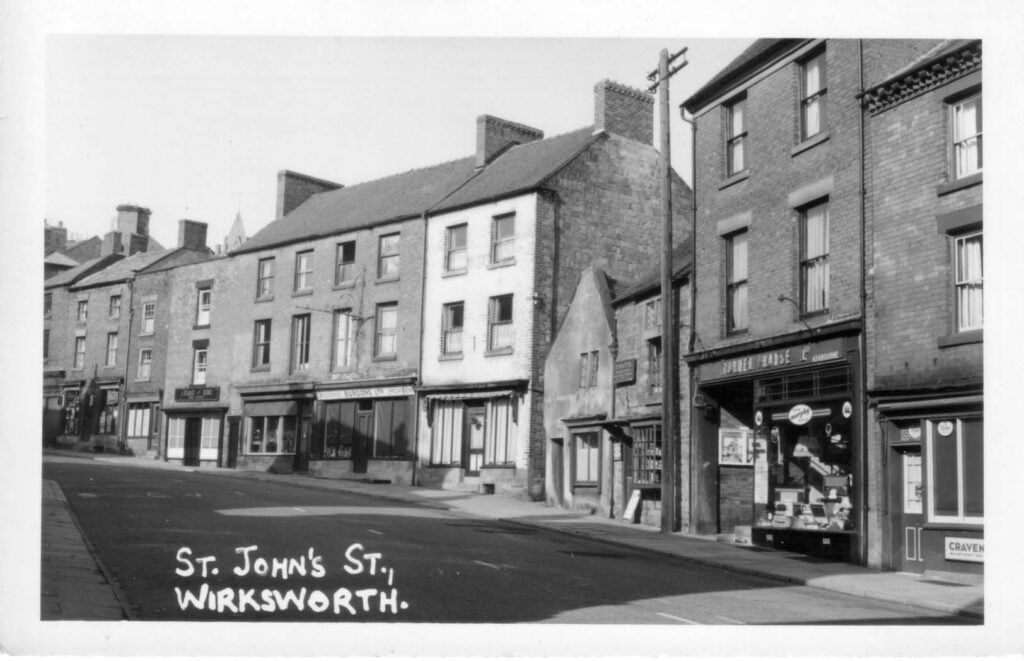While general stores, grocers and outdoor markets sold fruit and vegetables, Wirksworth’s greengrocers have provided a specialist service for centuries. Bulmer’s 1895 Directory of Wirksworth Trades and Professions lists four fruiterers and greengrocers: James Elliot (Coldwell Street), John Fennell (Coldwell Street), Herbert Palin (Market Square) and Joseph Talbot (North End). Greengrocers William Wheatcroft, C.A. Wain, Adam’s Apple, D.E. Wood and E. Eccleshare have all plied their trade within living memory. However, it was Palin’s that became Wirksworth’s leading greengrocer. John Palin (Wholesale) remains one of Britain’s largest independent wholesalers and distributors of fresh produce. Palin’s has supplied fruit and vegetables in Derbyshire for over 150 years.
Samuel Palin (1808 – 1891) was born at Billingwell, Nottinghamshire. By 1841, he was a post boy living in Matlock and by 1851 the Palin family had moved to 114 St Mary’s Gate, Wirksworth and Samuel’s occupation was recorded as greengrocer. By 1888, Samuel Palin had a shop in Coldwell Street, which he vacated when the Baptist Chapel was built on the site and the shop demolished. The 1881 Census return confirms Samuel’s son, Herbert (1847 – 1920 had a shop at the Old Market Place. Resident Bertram Haworth (1904 – 1998) remembered this greengrocer tucked into the bottom left of the Hope and Anchor as first Palin’s then Wheatcroft’s during his early 20th century childhood.
Palin’s Fruit and Veg
Around the turn of the 20th century, Herbert Palin travelled the local countryside delivering fruit and vegetables. The 1901 Census names him a potato merchant and farmer in 1901. His wife, Jane Palin, worked in the shop alongside daughter Lizzie and was remembered as a ladylike woman who built up a thriving business. Herbert kept an eye on quality and saved the cost of carriage by fetching his produce from Melbourne market gardens almost daily. Their son Sam, a sergeant in the Derbyshire Yeomanry, expanded the greengrocer business in fresh premises. All the Palins were ardent Congregationalists at Wirksworth in their day.

Sam Palin and son John made weekly deliveries to numerous villages around Wirksworth, initially travelling by horse and dray, later using a lorry.
Palin’s premises at 4 Market Place, Wirksworth was a traditional greengrocer’s shop. Max Hodnett recalled shopping at Palin’s during the Second World War, ‘Miss Dorothy Palin held sway, always with a ready joke delivered in a booming voice.’
Roger and Sam Palin were the seventh generation to be involved in the business. The shop in the Market Square closed its doors in the late 1980s. John Palin continued to provide wholesale produce.
Grocers in Wirksworth
The word ‘grocer’ has long passed out of general usage: today’s children would find it unfamiliar, although grocers used to be part of our daily lives. Before supermarkets, small towns like Wirksworth were provisioned by small outlets all over town. The housewife would not have to walk far with her loaded basket, and some larger establishments offered a delivery service.
Grocers and their addresses were listed in early trade directories alongside all the other occupations which made up the life of a busy market town serving a wide rural area. There were 15 Wirksworth grocers in 1899, dropping to 11 in 1911. Some names continue over the years – Gamble’s in Dale Street and St John Street, Thomas Atkinson at the Town Hall and the Potter family in St John Street. There was enough trade at that time to support grocers at numbers 17, 21, 37 and 55 St John Street. The Market Place and The Dale had their own grocers. Gamble’s shop on St John Street eventually became Mart’s, and now Dip’s Place carries on the tradition.
These grocers and provision merchants often involved several generations and had inter-family connections. Many were also tea-dealers, seedsmen, newsagents or off-licences and some sold greengrocery. Some did not thrive and the premises changed hands. Some grew into large enterprises – Charles Wright & Son began as a humble tea dealer and expanded mightily over the course of a century. By the middle of the 20th century our information is gleaned from oral history. Small shops were still to be found all over town, as far as Wash Green and Gorsey Bank and Millers Green. Family businesses thrived, but in several cases the properties were now occupied by quite large corporate concerns – the Co-op, Burgons and Bagnalls.

Burgons moved from St John Street to take over from Hunters the Teamen, now the Mistral, and was part of a chain of stores founded in Manchester in 1847. With the growing population of workers flooding into the city, new ways of provisioning large numbers of people were needed. Burgons’ large-scale production, storage and supply lines made it possible to have branches as far afield as Derbyshire. The company was dissolved in 1976, but many people remember it, albeit as a relic of the Victorian age.
Bagnallsoccupied what is now Ken’s Supermarket and was an offshoot of the business in Ashbourne, where they were widely regarded as first-class grocers and wine merchants. They sold a comprehensive range of merchandise, including delicacies. The lad used to take weekly deliveries in panniers on his bicycle. Before Bagnalls the premises were occupied by three separate shops – a grocer, a hairdresser and umbrella mender, and a watch-mender. All had families living above the shop.
Mart’s in St John Street, now Dip’s Place, was a general store, but also sold newspapers and greengrocery. Prior to that, the shop was Wains, one of the town’s greengrocers. Mart’s were probably the first Wirksworth grocer to stock organic food. In 2019, Elaine Mart remembered how people used to fight over their home-made scones and queued for the ham, sliced to the customer’s exact requirement. The hams arrived from Dronfield to be cut on the machine – fingers to be carefully watched! As in all shops, customers came in many varieties. One regular parked his tractor across several parking spaces. One legendary customer, who liked a tipple, famously confused his tins of stewed steak and dog food, much to the delight of the dog, but not the unfortunate customer, who was known as Mr Windy after that!

